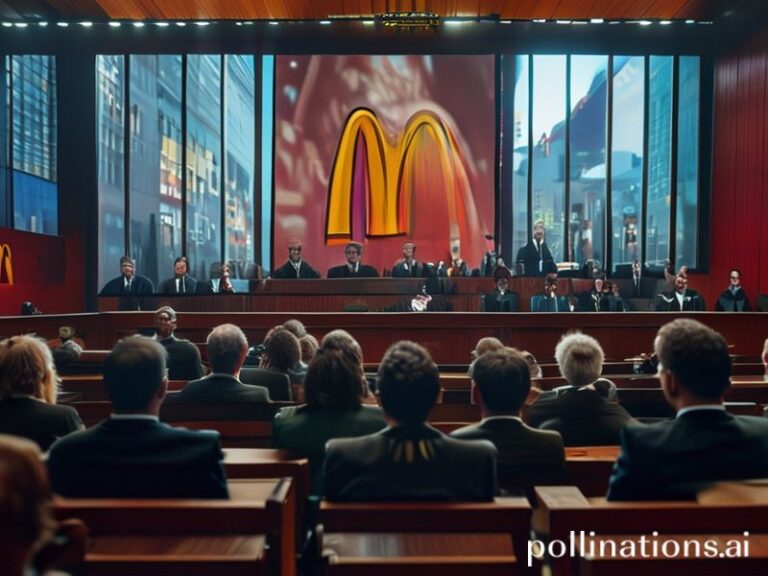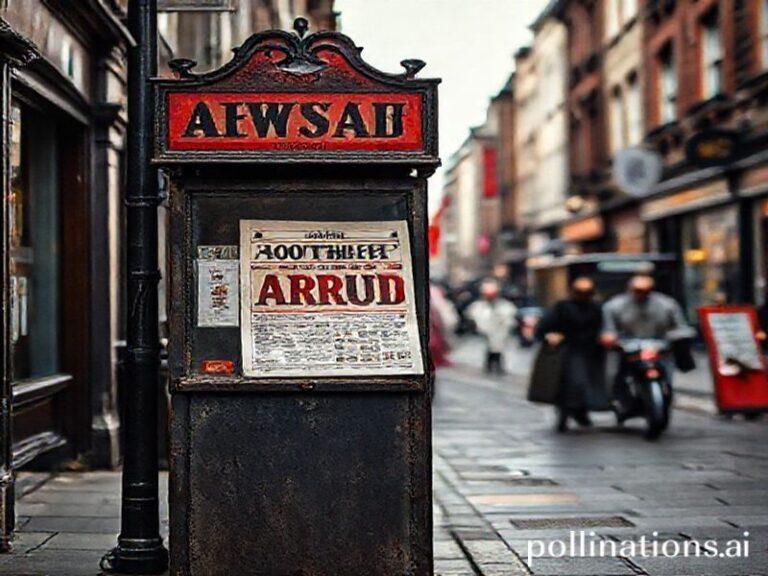Richard Madeley: The Unlikely Global Ambassador of Weaponized British Cringe
Richard Madeley: Britain’s Export-Grade Embarrassment and the Global Art of Cringe Diplomacy
by our Special Correspondent in Existential Freefall
There is a moment—usually about 3 a.m. local time—when hotel televisions in foreign capitals surrender to the BBC World feed and something extraordinary happens. Statesmen pause mid-sentence, warlords lower their satellite phones, and even the hotel goldfish seems to blink. On screen appears Richard Madeley, professional Englishman, asking a Ukrainian mayor whether the Russians are “a bit like the Borg, really?” The room exhales a collective, multinational wince. In that instant, Madeley stops being merely a British television presenter and becomes a soft-power munition: a cruise missile of cringe wrapped in a Marks & Spencer blazer.
To the uninitiated, Madeley is the man who once asked a surfer if sharks “have personal vendettas” and informed a genocide survivor that her story was “almost cinematic.” Abroad, clips of these exchanges circulate like diplomatic cables with laugh-cry emojis attached. In Brussels, policy fellows use them as ice-breakers at NATO receptions (“Have you seen the one where he compares Brexit to a soufflé?”). In Tokyo, late-night variety shows splice his interviews with Godzilla roars for comedic effect. Even in Pyongyang, where the Internet is rationed like cooking oil, a heavily pixelated version reportedly circulates among elite cadres who consider it documentary proof of Western decline.
Yet beneath the global rubber-necking lies a darker utility. Madeley is Britain’s unconscious ambassador of managed decline, the smiling face of a post-imperial power outsourcing embarrassment in real time. Where once gunboats enforced influence, now a 67-year-old man in rimless spectacles asks Moldovan ministers if vampirism is “still a thing.” The Foreign Office may deny any formal role, but soft power has always been cheaper than frigates. Why spend £6 billion on an aircraft carrier when a single breakfast-show segment can persuade the world that Britannia still rules the waves—of secondhand mortification?
International development economists have a term for this: “negative brand spillover.” Like fast-fashion factories that dump surplus dye into rivers, the UK now offloads surplus awkwardness via satellite uplink. NGOs measuring cultural carbon footprints list “Madeley Minutes” alongside micro-plastics and aviation fuel. If globalism promised the free movement of goods and ideas, Madeley is the recalled product nobody ordered but everyone tweets about.
The phenomenon has spawned its own micro-industries. Silicon Valley start-ups sell browser plug-ins that replace Madeley’s face with stock footage of tranquil koi ponds. A Lagos-based streaming platform has turned his interviews into a drinking game: sip every time he says “fascinating,” down the bottle when he mentions D-Day. Meanwhile, a shadow economy of YouTubers from Seoul to São Paulo makes ad revenue dissecting his syntax like Talmudic scholars, pausing at the precise microsecond he conflates the IMF with the MCC. If soft power is the ability to get others to want what you want, Madeley has inadvertently convinced the planet it never wants to be interviewed again.
Still, there is something almost admirable in the purity of his obliviousness. While other nations weaponize TikTok diplomacy or pay influencers to sip yak-butter lattes in Bishkek, Britain doubles down on a man who once asked a Nigerian feminist if she owned a “juju doll.” It is as if the entire country has decided that since the empire is gone, the only territory left to colonize is the inside of your own foot, preferably while live on air.
And perhaps that is the ultimate global significance of Richard Madeley: he is living proof that embarrassment, like CO₂, respects no borders. Long after Brexit paperwork yellows, after the last royal corgi trots off this mortal coil, future archaeologists will unearth a dusty server rack labeled “Madeley Archive” and conclude that twenty-first-century Britain’s final export was not steel, or services, or even culture, but a pure, weaponized form of vicarious shame—shipped worldwide in HD, duty-free.
As the sun sets on yet another G7 summit, delegates will clink glasses and whisper the same dark joke: if you want to understand modern Britain, skip the white papers and just watch the man ask a Finnish president whether Santa is “realistic about supply-chain constraints.” Somewhere, a ratings algorithm purrs. The empire may be gone, but the cringe goes on forever.







